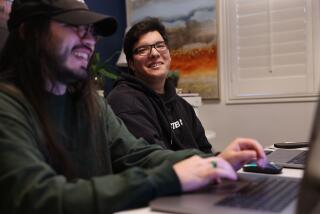Learning Together
The women in Susan Patton’s class at Burbank Adult School are learning to read better in order to educate their children.
Many of them are immigrants whose English is poor. They spend 12 hours a week learning to read and write in their new language while their children attend preschool classes.
“The main goal is to teach the mothers how to be their child’s first and lifelong teacher,” Patton said.
Now in its second year at the school, the program in English as a second language and reading readiness is designed to provide the mothers with the language and reading skills to participate in their children’s education.
The 25 current participants are all mothers of 4-year-olds. Patton said the school chose that age group so that the mothers can help prepare their children for kindergarten. Fathers are welcome to join, but many are unable to because of daytime jobs.
Patton said a key element is instructing the mothers in how to share their new reading and communication skills.
“Why is it important to listen and talk to your child?” Patton asked the women in her classroom one recent morning.
“It helps them to read better,” said Gode Barbosa, whose son Alex is a preschooler. Originally from Mexico, Barbosa has lived in Burbank about 18 months.
Patton agreed and added: “It helps them to learn better. They’re learning more words, they’re listening to [your] words. If they never listen to you speak, how will they ever learn?”
The class meets four times a week. Patton requires that the mothers write in their journals and complete sentences that she writes on the board. She assigns homework that they’re supposed to do with their children.
Patton also asks them to read aloud from children’s books and the guide to the public library. Patton said many of the mothers did not go beyond the sixth grade in their native countries and did not have a library card until they joined the class. Now the women visit the library regularly and take out books they can read to their children.
The program is among many trying to reach the thousands of California residents who have limited English language skills.
During the 1997-98 school year, almost 1.5 million California residents, were enrolled in the state’s adult education programs, according to a study conducted by the state Department of Education. Of those, about 1.2 million were in programs in English as a second language. The study showed that 13.7% of the ESL learners who enrolled in the program may not have been able to read or write in any language.
All the women in the Burbank Adult School class can read in their own language, but the program helps them build confidence in their English, Patton said.
Patton said the program also seems to help build confidence. Parents never want to have to tell their children that they cannot help them with their homework because they can’t understand it, she said.
“I’ve had mothers cry because their children thought they were dumb and didn’t know anything,” she said. Many of the mothers in her class spend their nights working and their days with their children, Patton said.
Several participants said the program changed their lives.
Armik Baylian, an Armenian woman who lives in Tujunga with her son Arthur, said she reads to him in the afternoon and at night.
“This year, I’m seeing the progress in his learning,” Baylian said.
Esther Aquino moved to Burbank from Mexico six years ago. “I want him to learn English,” she said in Spanish as her son Kevin played with a puzzle. “I have to teach him things, and I want to do it.”
While the mothers learn English, their children learn shapes, colors and the alphabet at preschool classes next door. About two hours into the class, the mothers and children get together for a time of singing, reading and playing. Ann Brooks, director of the Burbank Adult School, calls the program the pre-literacy phase of the children’s education. She said that until they joined the program, many of the children had little contact with reading material.
“Literacy is something that will be more successful if the whole family is involved,” Brooks said. “If you can get the parent involved in the beginning of a child’s education, it’ll strengthen the entire school experience.”
Educators agree on the merits of introducing children to books at an early age, but some have questioned the effectiveness of putting too much pressure on youngsters. “When I first started teaching, I was a kindergarten teacher. I had strong opinions about pushing kids too fast, too soon,” said Marilyn Ramsey, principal at Luther Burbank Middle School.
Ramsey has since changed her mind and currently runs a reading program for students starting in kindergarten.
“It’s critical that we set kids up for success,” Ramsey said. “It’s preparing kids to be ready to receive the printed word. I think we should teach reading in preschool as well as phonemic awareness and nursery rhymes.”
More to Read
Sign up for Essential California
The most important California stories and recommendations in your inbox every morning.
You may occasionally receive promotional content from the Los Angeles Times.










